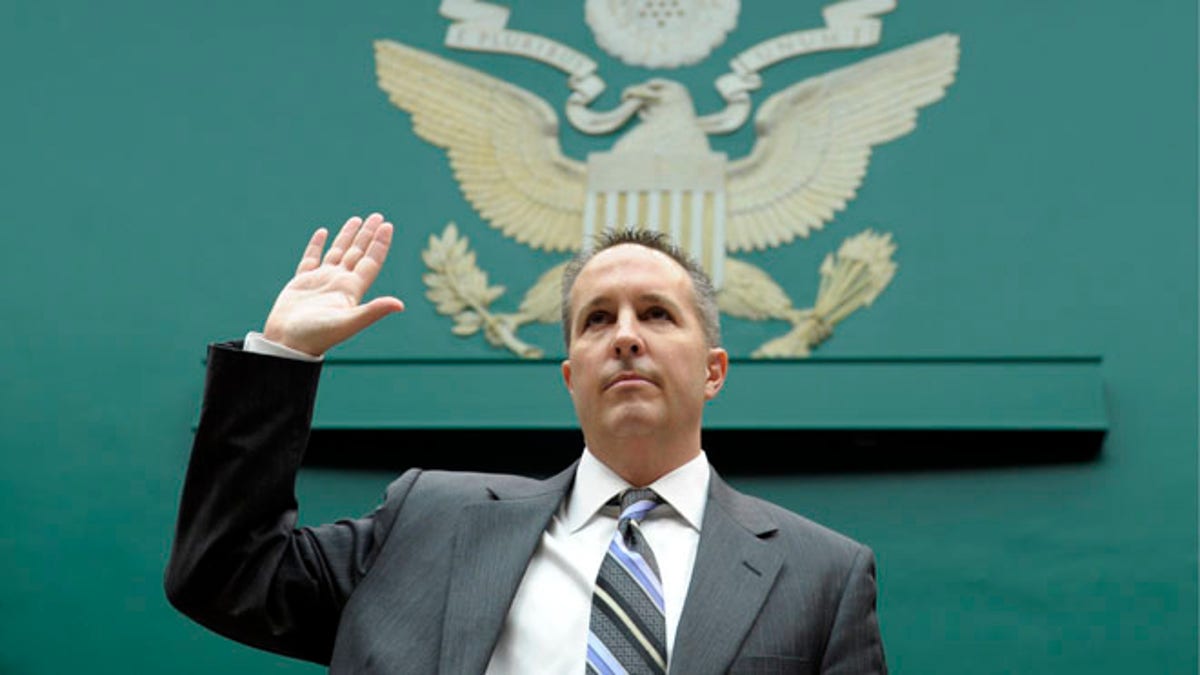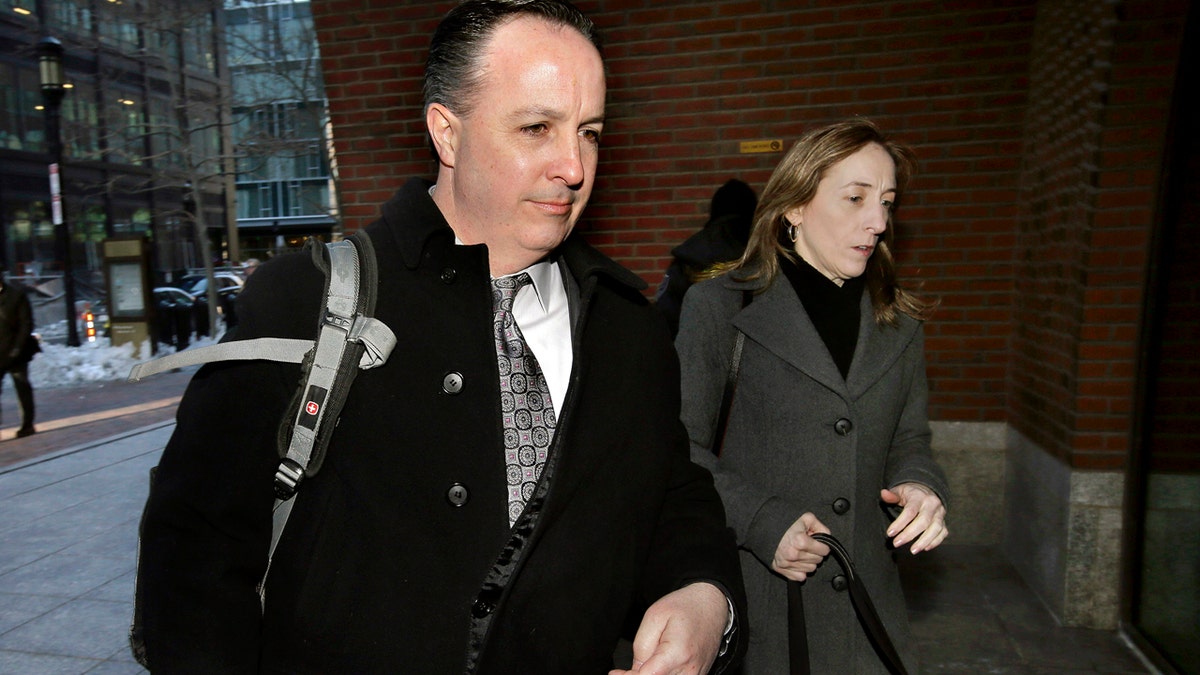
Nov. 14, 2012: New England Compounding Center President, co-owner, and Director of Pharmacy Barry Cadden is sworn in on Capitol Hill in Washington. (AP)
Barry Cadden, co-founder of the New England Compounding Center (NECC), the now-defunct pharmaceutical company linked to a 2012 deadly meningitis outbreak, was sentenced to nine years in prison on Monday for his role in the spread of the disease.
Cadden was cleared by a jury in March of second-degree murder charges — likely avoiding spending the rest of his life in prison — but was convicted of multiple counts of fraud, conspiracy and racketeering. Cadden, was once was the president and head pharmacist of the New England Compounding Center.
Read on to find out more about this case.
What happened in 2012?
As many as 13,000 people nationwide may have received injections with contaminated medicine from NECC of Framingham, Massachusetts, the Centers for Disease Control and Prevention estimated.
At least 700 people were sickened by fungal meningitis and other infections in 2012, and 64 people died. Still others live with chronic pain from the tainted injections.
The outbreak affected people in 20 states with Indiana, Michigan and Tennessee being the hardest hit.
Why would Cadden be responsible?
Prosecutors accused Cadden’s company of using expired ingredients and falsifying logs in an attempt to show that rooms had been cleaned when they were, in fact, not.
Prosecutors said Cadden and his employees knowingly shipped tainted steroids — usually prescribed to patients with back pain — across the country.
EX-PHARMACY EXEC ACQUITTED OF MURDER IN MENINGITIS OUTBREAK
Following the outbreak, multiple instances of contamination — including standing water, mold and bacteria in the air and on workers’ gloved fingertips — were found.
Prosecutors also accused Cadden of running his pharmaceutical company in an “extraordinarily dangerous” way as he allegedly ignored sterility and cleanliness regulations in lieu of churning out product faster to make more money.
"It was preventable, but it happened because this man, Barry Cadden, decided to put profits before patients," Assistant U.S. Attorney Amanda Strachan said during the trial.
In turn, Cadden’s lawyers argued that he was not directly responsible for the unclean rooms; instead, the lawyers argued, supervisory pharmacist Glenn Chin was responsible for the rooms where the drugs were made.
Chin pleaded not guilty to similar charges. He is expected to face trial in September.
“As horrible as each of these stories is, there is nothing that shows that Mr. Cadden did something that the government can link to the death of that person,” attorney Bruce Singal said.
So what is he actually guilty of?
Cadden was acquitted in March 2017 of causing the deaths of the people infected. But a jury did find him guilty of some racketeering and fraud charges.
GOVERNMENT SEIZES $18 MILLION FROM OWNERS OF PHARMACY TIED TO MENINGITIS OUTBREAK
Jurors convicted Cadden of sending out the contaminated drugs but would not say he was guilty of purposefully misleading customers by providing them with contaminated products, according to the Boston Globe. The jury also refused to convict Cadden of willingly and knowingly mislabeling drugs.
The jury also cleared Cadden of charges that he defrauded the US Food and Drug Administration by using NECC as a pharmacy instead of a manufacturing center, the Boston Globe reported.
What could happen to Cadden and his company?
NECC filed for Chapter 11 bankruptcy in December 2012. At the time, it said it wanted to establish a fund to compensate those affected by the deadly meningitis outbreak.
By 2015, the company had more than 3,400 claims filed against it — including more than 1,000 claims from those who were seriously injured during the outbreak or relatives of those who were deceased.
MENINGITIS OUTBREAK: MURDER OR PUBLIC HEALTH TRAGEDY?
A federal bankruptcy judge approved a $200 million settlement in 2015 that would compensate NECC’s creditors — including the victims.
Each of Cadden’s fraud and racketeering convictions carry a potential sentencing of up to 20 years in prison, but multiple sentences can often be served at the same time, the Boston Globe reported.
Cadden’s sentencing will be based on the nature of the crime, his personal character and his lack of a criminal record, according to the Boston Globe.

Barry Cadden, center, arrives at the federal courthouse, Thursday, March 16, 2017, in Boston, before scheduled closing arguments in his trial. Cadden, a former pharmacy executive and the president of New England Compounding Center, is charged with causing the deaths in 2012 of 25 people who received tainted steroids manufactured by the pharmacy. (AP Photo/Steven Senne) (AP)
But prosecutors are hoping for a harsher sentence from the judge due to a quirk in the trial verdict.
Instead of simply checking “guilty” or “not guilty” when filling out their verdict slip, prosecutors said jurors wrote the numbers of those who thought Cadden was guilty or not of the 25 counts of murder he faced, according to Reuters.
"While they failed to reach unanimity on these racketeering acts, the jury's verdict confirmed that the murder racketeering acts were proven by a preponderance of the evidence in this case, and can be properly considered at sentencing," prosecutors wrote in a motion filed after the verdict trial.
Is anyone else facing charges for the deadly outbreak?
Aside from Chin — who faces similar charges to Cadden — multiple other NECC employees may face consequences for the company’s role in the deadly outbreak.
In all, 14 people were originally charged.
LAWYERS TRADE BLAME IN MENINGITIS OUTBREAK TRIAL
Carla Conigliaro, the majority owner of NECC, pleaded guilty in July to illegally transferring assets after the outbreak. Her husband did the same. The pair was sentenced. They also had to pay fines.
Robert Ronzio, who was the company’s sales director, also pleaded guilty to conspiring to defraud the Food and Drug Administration. Ronzio is expected to be sentenced in September, WBUR reported.
Two pharmacists, Kathy Chin and Michelle Thomas, were cleared of any criminal liability by a judge in October, according to WBUR. The judge said that while the pair checked and shipped orders, they did not dispense the drugs.
Alla Stephanets, another pharmacist, was also cleared of similar charges but still faces a fraud charge, according to WBUR.








































